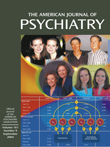Genetic and Environmental Sources of Covariation Between Generalized Anxiety Disorder and Neuroticism
Abstract
OBJECTIVE: The authors examined the sources of covariation between generalized anxiety disorder and the personality trait of neuroticism. Because women have higher levels of neuroticism and twice the risk of lifetime generalized anxiety disorder of men, gender-specific effects were also explored. METHOD: Lifetime generalized anxiety disorder and neuroticism were assessed in more than 8,000 twins from male-male, female-female, and opposite-sex pairs through structured diagnostic interviews. Sex-limited Cholesky structural equation models were used to decompose the correlations between generalized anxiety disorder and neuroticism into genetic and environmental components, including sex-specific factors. RESULTS: Genetic correlations between generalized anxiety disorder and neuroticism were high and differed (nonsignificantly) between men and women (1.00 and 0.58, respectively). When nonsignificant gender differences were removed from the models, correlations between generalized anxiety disorder and neuroticism were estimated at 0.80 (95% confidence interval=0.52–1.00). The individual-specific environmental correlation between generalized anxiety disorder and neuroticism was estimated at 0.20 for both genders. CONCLUSIONS: There is substantial overlap between the genetic factors that influence individual variation in neuroticism and those that increase liability for generalized anxiety disorder, irrespective of gender. The life experiences that increase vulnerability to generalized anxiety disorder, however, have only modest overlap with those that contribute to an individual’s level of neuroticism.



